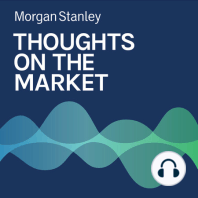3 min listen

Matthew Hornbach: Will Treasury Yields Move Higher?
Matthew Hornbach: Will Treasury Yields Move Higher?
ratings:
Length:
3 minutes
Released:
May 26, 2022
Format:
Podcast episode
Description
With growth slowing and the Fed focused on fighting inflation, investors should note that the outlook for government bonds depends on more than just central bank policy.-----Transcript-----Welcome to Thoughts on the Market. I'm Matthew Hornbach, Global Head of Macro Strategy for Morgan Stanley. Along with my colleagues, bringing you a variety of perspectives, I'll be talking about global macro trends and how investors can interpret these trends for rates and currency markets. It's Thursday, May 26th, at 11 a.m. in New York. For government bond markets, the start to 2022 will go down in the history books. Since the start of the year, central banks have delivered changes to monetary policies and associated forward guidance. And as a result, government bond markets have had their worst start to the year in decades. The repricing in markets ultimately came as a result of central banks surprising expectations among economists and market participants alike. Heading into the year, our economists thought that the Federal Reserve would continue to buy bonds well into 2022 and that it wouldn't be ready to raise policy rates until 2023. Since then, however, the Fed has stopped its asset purchases, announced plans to shrink its balance sheet starting in June and has hiked short term rates by 75 basis points already. Our economists now expect the Fed to deliver two more 50 basis point rate hikes this year, then downshift to a series of 25 basis point moves. At the end of the year, they see the Fed funds target range at 2.5% to 2.75%, and the Fed's balance sheet on its way to $6.5 trillion. However, investors should note that the outlook for government bonds depends on more than just central bank policies. For example, projected government deficits and related financing needs will decline substantially this year, and more fully in 2023. In addition, risks to global growth skew to the downside already. And as monetary policies tighten, downside risks to growth, and eventually inflation, will increase. These conditions, which traditionally support government bonds, factor into our view for how yields will evolve over the next 12 months. We expect U.S. Treasury yields to move higher through 2023, but not materially so. A continued focus on above target inflation should keep the Fed marching towards a neutral level for policy this year. Our economists anticipate a front loaded hiking cycle, with early increases in the Fed funds rate being more important than the potential for later ones. With this Fed forecast, we expect front end yields to trace market implied forward yields, largely consistent with two year Treasury yields reaching 3.25% by the end of the year. In contrast, demand from investors looking to hedge risks to a weaker outcome for global growth will likely show up in the longer end of the Treasury curve. We think the ten year yield will end the year near 3%, which is a level we were at not that long ago. As a result, we're forecasting an inverted yield curve at year end. With inflation remaining high and growth slowing, discussions of stagflation or outright recession should continue to lead investor debate this year. And ultimately, that should limit the degree to which Treasury yields rise into year end. Thanks for listening. If you enjoy Thoughts on the Market, please take a moment to rate and review us on the Apple Podcasts app. It helps more people find the show.
Released:
May 26, 2022
Format:
Podcast episode
Titles in the series (100)
Mike Wilson: 3 Summer Surprises Investors Could Be Missing by Thoughts on the Market